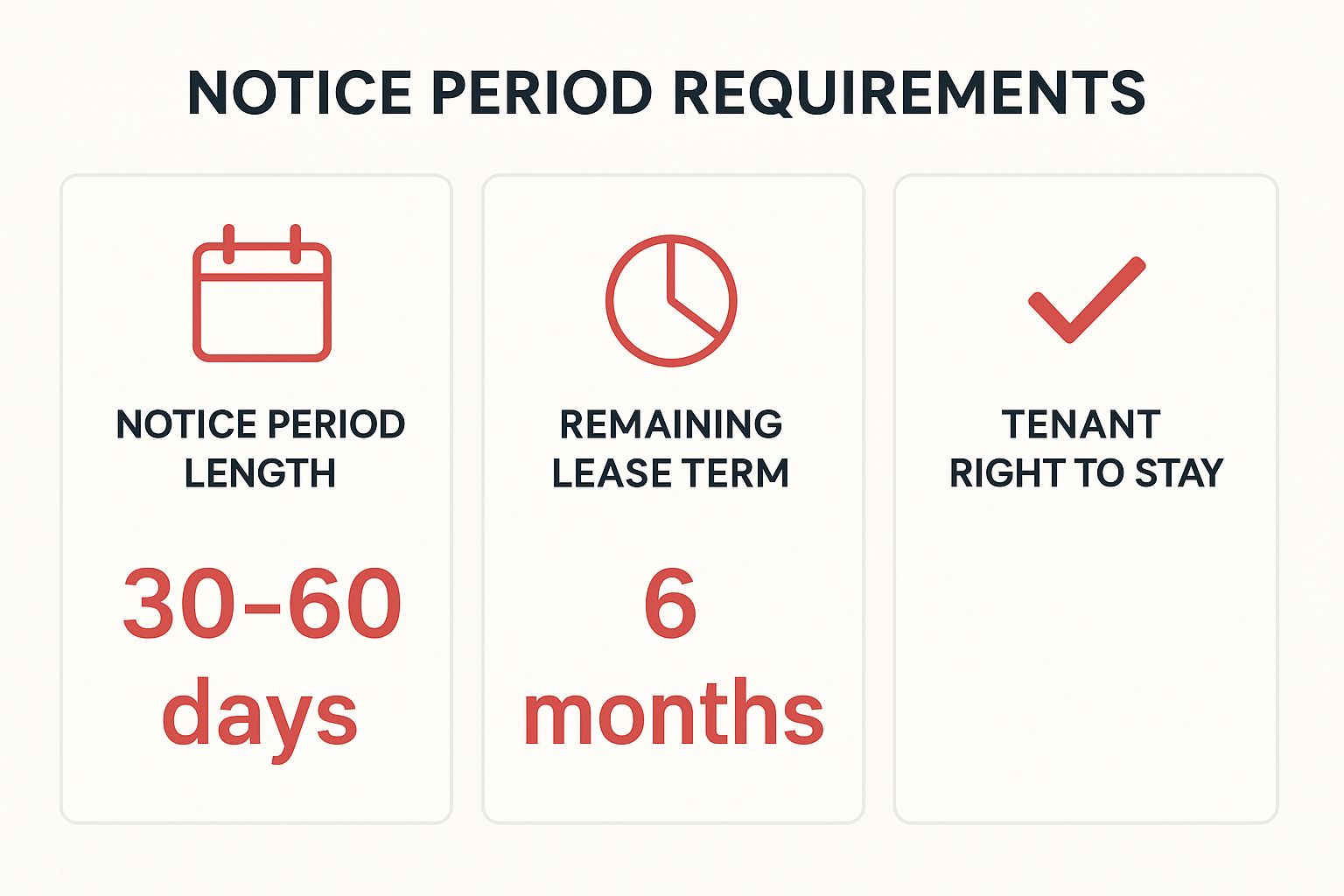Selling a house with a tenant in Cleveland? It's absolutely doable, but it really boils down to a few key decisions you'll make right at the start. The whole process kicks off with a deep dive into your current lease agreement, as that single document dictates your timeline, your legal moves, and even who your ideal buyer might be.
Your main choice will be whether you want to sell to another investor who's happy to keep the tenant, or if you're aiming for a traditional homebuyer, which almost always means the property needs to be empty.
Your First Moves in a Tenant-Occupied Sale
Selling a property in Cleveland with a tenant already living there adds an extra layer to the process, no doubt. But with a clear strategy, it's nothing to worry about. Your journey doesn't start with a "For Sale" sign in the yard; it starts with a careful read-through of your lease agreement. Knowing the exact terms you and your tenant agreed to is the bedrock of a smooth, legal, and successful sale.
The type of lease you have is what really sets the stage. In Ohio, a fixed-term lease typically rolls over to the new owner. This means your tenant has the legal right to stay put until their lease is up. On the other hand, a month-to-month lease gives you a lot more breathing room—usually, all that's needed is a 30-day written notice to vacate. This one detail often shapes your entire sales strategy from day one.
Investor or Traditional Homebuyer: Choosing Your Path
Once you’re crystal clear on your lease situation, you've got a big decision to make. Are you going to market your property to another real estate investor, or will you aim for a traditional homebuyer who plans to move in themselves?
There's no single right answer; it's about what works for you.
- Selling to an Investor: This is often the path of least resistance. Investors hunting for properties in areas like Parma or Lakewood love the idea of immediate cash flow from a reliable, in-place tenant. They get it. They're used to buying properties with leases attached and know the drill.
- Selling to a Homebuyer: This route can often bring in a higher sale price, but it comes with a catch—the property usually needs to be vacant. You'll have to coordinate the tenant's move-out, which could involve a mutual agreement, offering a "cash for keys" deal, or simply waiting for the lease to naturally expire.
This infographic breaks down some of the typical timelines and rights involved when you're navigating a sale with a tenant.

As you can see, even when you provide notice, a tenant's right to stay for their full lease term is a huge factor. It directly impacts your sale's timeline and the pool of buyers you can attract.
Deciding between these two buyer types is a critical step that shapes the entire transaction. Here's a table to help you weigh the pros and cons for your specific situation in Cleveland.
Choosing Your Buyer: Investor vs. Traditional Homebuyer
| Factor | Selling to an Investor (Tenant Stays) | Selling to a Homebuyer (Tenant Leaves) |
|---|---|---|
| Sale Speed | Often faster, as investors can close quickly and aren't waiting on a vacant property. | Slower. You must wait for the lease to end or negotiate an early move-out. |
| Sale Price | May be slightly lower, but you avoid vacancy costs and turnover expenses. | Typically a higher sale price, as the buyer pool is larger. |
| Convenience | High. No need to coordinate showings around an empty house or manage a move-out. | Lower. Requires coordinating the tenant's departure, cleaning, and staging. |
| Tenant Impact | Minimal disruption for the tenant, which can lead to better cooperation. | High disruption. The tenant has to find a new place and move. |
| Cash Flow | You collect rent right up until the day of closing. | You lose rental income during the vacancy period before the sale closes. |
Ultimately, the best choice depends on your priorities. If you value a quick, simple sale with zero income loss, an investor is likely your best bet. If maximizing your sale price is the top goal and you have the time to manage a vacancy, then targeting a traditional homebuyer might be the way to go.
Understanding Ohio Landlord-Tenant Laws
Making sure you're on solid legal ground is non-negotiable. Ohio law is clear: landlords must provide "reasonable notice" before entering a property for showings. While the law isn't super specific on the timeframe, the accepted standard is at least 24 hours.
It's a really good practice to document all your communications about showings in writing—email or even text messages work great. This creates a clear paper trail and helps you sidestep any potential disagreements down the road, ensuring you're fully compliant with Ohio regulations.
By taking the time to review your lease, pick your target buyer, and know your legal duties inside and out, you can build a clear roadmap for selling your tenant-occupied house in the Cleveland area. What seems like a potential headache can absolutely be turned into a successful and profitable transaction.
Understanding Ohio Lease Agreements and Tenant Rights
When you're selling a house with a tenant in Cleveland, that lease agreement isn't just a piece of paper—it's your rulebook. Ohio law is the referee here, and it dictates exactly what you can and can't do. Getting a handle on these legal specifics from the get-go is the only way to ensure a smooth, lawful sale.
The single most critical detail in that lease? The term. It’s going to shape your entire sales strategy, from the timeline you can expect to the kind of buyer you'll attract.

Fixed-Term vs. Month-to-Month Leases
In Ohio, leases pretty much fall into two camps, and each one has massive implications for how you can sell the property.
A fixed-term lease is exactly what it sounds like: a binding contract for a set period, usually a year. If you sell a property with this kind of lease in place, the entire agreement transfers to the new owner. Your tenant has the legal right to stay put until that lease expires, and the new owner is legally obligated to honor every single term.
This is a make-or-break detail for buyers. An investor might see this as a huge plus—instant, guaranteed income. But a family looking for a home in a suburb like Strongsville or Westlake? They’ll probably walk away, since they can't move in.
On the other hand, a month-to-month tenancy gives you a lot more breathing room. Under Ohio law, you can end this kind of agreement by giving the tenant a written 30-day notice to vacate. This flexibility is a huge advantage, opening up your property to a much wider pool of buyers who want a vacant home.
Navigating Showings and Tenant Communication
Ohio law is clear: landlords must give tenants "reasonable notice" before entering the property for showings. While the statute doesn't spell out a specific number of hours, the accepted standard across the state is at least 24 hours' written notice.
It's absolutely crucial to document every single conversation about showings. A quick email or text creates a clear paper trail. This record can be a lifesaver if a dispute comes up and proves you’ve respected your tenant’s rights.
Remember, even with proper notice, you can't just demand entry. A cooperative tenant is your best asset; they'll help make sure the home is presentable and that showings go off without a hitch. If a tenant consistently refuses entry after you’ve given proper notice, it could be a lease violation, but that path should always be a last resort.
For landlords in especially tough spots, like those facing potential foreclosure, it’s critical to know all your options. You can learn more by exploring resources on handling foreclosures in Cleveland, Ohio, which often bring up complex tenant and property rights issues.
Strategic Options: The Cash for Keys Agreement
So what happens when you have a great tenant locked into a fixed-term lease, but your perfect buyer wants an empty house? You can't legally kick them out, but you can negotiate. This is where a "cash for keys" agreement comes into play.
The strategy is simple: you offer your tenant a lump-sum payment if they agree to voluntarily move out before their lease is up. The amount is completely negotiable, but it typically covers things like their moving costs and the security deposit on a new place.
Suddenly, a potential legal headache turns into a win-win. You get the vacant property you need to close the deal, and your tenant gets the financial cushion to find a new home. It makes the whole transition smoother for everyone involved.
Building a Cooperative Relationship With Your Tenant
Let's be honest: the success of selling a house with a tenant boils down to one critical factor—their cooperation. A tense, awkward situation can quickly become a productive partnership, but it all hinges on how you approach them from the very beginning.
Your first conversation sets the tone for everything that follows. You need to make your tenant feel like a respected partner in this process, not an obstacle to be dealt with. They're going to have immediate questions racing through their minds, like "Do I have to move?" and "What's going to happen to my lease?" Get ready to answer those questions clearly and honestly.

Crafting a Positive First Conversation
A little empathy goes a long, long way. Remember, this news is disruptive to their life. Kicking off the conversation with respect is your best bet for getting them on your side.
Think about how you'd ask for showings. Instead of a demand, try a collaborative approach. Something like this works wonders:
"Hi [Tenant Name], I'm planning a few showings for the property this week. I want to be as respectful of your time as possible. Would Tuesday or Thursday afternoon work better for you? I’ll make sure to give you at least 24 hours' notice before anyone arrives."
This small shift in tone shows you value their privacy and their schedule. It makes them far more likely to make sure the place looks great for visitors, whether you're selling in Cleveland Heights or Shaker Heights.
Remember, a cooperative tenant is your most valuable asset during a sale. Their willingness to accommodate showings and keep the property presentable can directly impact your final sale price and timeline.
Meaningful Incentives That Actually Work
Going beyond the bare minimum legal requirements is how you turn a tenant into a true ally. Sure, you can't force them to deep-clean the kitchen before a last-minute showing, but you can definitely make it worth their while. Real, meaningful incentives show that you genuinely appreciate their help during what is a stressful time for everyone.
Think bigger than just knocking a few bucks off the rent. Offer perks that solve actual problems for them.
- A "Showing Bonus": Give them a $25 gift card to a local Cleveland coffee shop for every single showing they accommodate. It's a small gesture that adds up and shows appreciation.
- Professional Cleaning Services: This is a big one. Hire a service to do a deep clean before the professional photos are taken, and maybe even once a month while the home is on the market. It takes a huge burden off their shoulders.
- A Stellar Reference Letter: Offer to write a glowing, detailed letter of reference they can use for their next rental application. This costs you nothing but can be invaluable to them.
- Moving Assistance: If they'll need to move, offering to cover the cost of a moving truck or pay for a few hours of professional movers is a powerful incentive.
When you invest in this relationship, you’re not just being a good landlord—you’re making a savvy business decision. A happy, cooperative tenant helps ensure your property is shown in its best possible light, which almost always leads to a faster, more profitable sale.
How to Market Your Tenant-Occupied Cleveland Home

Selling a rental property is a totally different ballgame than selling a primary residence. You’re not just selling four walls and a roof; you're selling a financial asset. That means your entire marketing strategy needs to shift from tugging at heartstrings to presenting cold, hard data that gets investors excited.
Forget the fluffy language about neighborhood charm. Instead, lead with the numbers. This is your chance to frame the property as a performing asset, turning the tenant from a potential headache into one of your biggest selling points.
Craft a Listing That Speaks to Investors
Your property listing is your number one tool for snagging the right buyer. While a typical homebuyer wants to see photos of a cozy living room, an investor is immediately going to be running the numbers.
To get their attention, your listing needs to put the financials front and center:
- Current Rental Income: Be direct. "Currently generating $1,200/month in consistent rental income."
- Lease Details: Include the lease expiration date. Investors need this to plan their next move.
- Tenant Payment History: If your tenant is rock-solid, shout it from the rooftops. A line like, "Tenant has a perfect on-time payment history for 3+ years" is pure gold.
- Utility Arrangements: Briefly explain who foots the bill for utilities. This directly impacts the net operating income, so it's a crucial detail.
This approach instantly frames your property in Shaker Heights or Lakewood not just as a house, but as a turnkey investment. It’s true that market data shows homes with tenants can sometimes sell at a 5% to 15% discount compared to vacant ones, mainly due to the perceived hassle. But a data-rich listing that showcases stability and profitability goes a long way in closing that gap.
Implement Smart Showing Strategies
Let's be honest: coordinating showings is one of the trickiest parts of selling a house with tenants. You have to get buyers in the door without driving your tenant crazy. A haphazard approach will only lead to frustration for everyone involved.
A high-quality virtual tour isn't just a nice-to-have here; it's essential. It acts as a gatekeeper, letting serious buyers do a deep dive online first. This weeds out the tire-kickers and dramatically cuts down on disruptive in-person showings.
Try to consolidate viewings. You could schedule an "investor open house" or set up specific "showing blocks"—say, every Tuesday from 4-6 PM. This gives your tenant predictability and makes it easier for serious buyers to see the property.
An investor-focused marketing and showing strategy is the secret to a smoother, faster sale. Of course, if you need an even quicker sale without dealing with any of this, you might want to learn how to sell your house fast in Cleveland, OH through a direct buyer. This focused approach helps you attract the right people and get a strong offer without the usual friction.
Managing Showings and Ensuring a Smooth Closing
Okay, you’ve got the tenant on board and investors are starting to call. You're in the home stretch, but don't relax just yet. The final leg of this race—showings, the final walkthrough, and closing day—is all about careful coordination. Nailing these last few steps is what guarantees a clean handoff and protects you from any legal or financial headaches down the road.
One of the biggest friction points when selling a tenant-occupied home is simply getting buyers in the door. Even the most cooperative tenant has a life, and endless showing requests can become a major hassle for them.
This is why I’m a huge fan of using "showing blocks" (think Tuesdays from 5-7 PM) or even a single, well-marketed investor open house. It's a strategy that works incredibly well here in the Cleveland market. You get all your serious buyers through at once, which massively cuts down on the disruption for your tenant.
The Final Walkthrough and Property Condition
Right before closing, the buyer gets to do one last walkthrough. They aren't looking for new things to negotiate; they're just confirming that the property is in the same condition as when they first saw it. If your tenant is still living there, this is usually a non-issue. The place is expected to look… well, lived in.
But what if your deal hinged on the tenant moving out? This is where things can get dicey. You show up for the walkthrough and find they left behind a mountain of trash and a few new holes in the drywall. Panic sets in.
Don't. Here’s the game plan:
- Document Everything: Pull out your phone immediately. Take pictures and videos of all the damage and any junk left behind.
- Communicate Instantly: Get on the phone with your real estate agent and have them inform the buyer's agent. You need to be transparent and proactive.
- Negotiate a Fix: The quickest solution is almost always a credit at closing. Offer the buyer an amount to cover the cost of a junk hauler or minor repairs. It's far better than trying to delay closing to handle it all yourself.
Handling the Lease and Security Deposit at Closing
This is one of the most critical—and often misunderstood—parts of the entire transaction. You don't just hand the lease over to the new owner. The transfer of the lease and the security deposit is a formal, legal process handled by the title company.
Here’s a breakdown of how it works in Ohio:
- Lease Transfer: The lease agreement itself is legally assigned to the new owner. They step into your shoes as the landlord and are bound by the exact same terms until the lease expires.
- Security Deposit Transfer: You do not give the security deposit back to the tenant. Instead, the title company will credit the buyer for the full deposit amount on the closing statement. That same amount is then debited from your sale proceeds. The new owner is now on the hook for returning it to the tenant when they eventually move out.
- Rent Proration: The title company will also prorate the rent for the month of closing. Let's say you close on the 15th and have already collected the full month's rent. The buyer will get a credit for the portion of the month they will own the property, and that amount will be deducted from your payout.
A clean handoff at closing is your best protection against future liability. Ensuring the title company correctly documents the transfer of the security deposit and prorated rent means you're officially and legally clear of your landlord obligations for the property.
In today's real estate market, a smooth, drama-free closing is more valuable than ever. In 2023, total existing home sales dropped to just 4,090,000—an 18.7% plunge from 2022 and the lowest volume seen since 1995. This shift means sellers are facing less buyer competition, making a well-managed, uncomplicated closing a huge selling point. You can dig deeper into U.S. property market trends to see how these changes might impact your sale.
Common Questions on Selling a Tenanted Ohio Home
Selling a property in Cleveland with a tenant in place always brings up a few key questions. It's totally normal to feel a bit uncertain, but getting the right answers upfront is the best way to handle the sale confidently and legally. Let’s walk through the most common things landlords ask me about.
Probably the biggest question I hear is, "Can I end my tenant's lease just because I want to sell?" In Ohio, the answer to that is a hard no. A fixed-term lease is a binding contract that survives the sale of a property. The new owner steps into your shoes and must honor that lease right up until its expiration date.
Now, if you have your tenant on a month-to-month agreement, you've got more options. A simple 30-day written notice to vacate is all you need. This can definitely open the door to a larger pool of buyers who want to move in themselves.
Handling Security Deposits and Showings
What happens to the security deposit? That’s another frequent point of confusion. The security deposit transfers from you, the seller, to the buyer at closing. This isn't a literal cash handoff. The title company will handle it as a credit to the buyer on the final settlement statement. You’re also legally required to give your tenant written notice of this transfer, complete with the new owner’s name and contact information.
And what about showings? Does your tenant have to let people in? Yes, they do. Ohio law says they must allow access as long as you provide "reasonable notice," which is almost universally understood to be 24 hours. But let's be real—forcing the issue is never the best approach. Building a little goodwill goes a lot further than waving a legal document around. For more in-depth answers, our comprehensive FAQ page is a great resource for landlord-seller situations.
The real estate landscape is always shifting. Recent trends show that market fluctuations can significantly impact the appeal of rental incomes for investors, making a cooperative tenant who presents the property well a massive asset.
Think about it this way: vacancy rates, which dropped like a rock during the pandemic, started creeping up in 2023 as new construction cooled off from its 2022 peak. These market dynamics directly affect how attractive an occupied property looks to an investor. You can dive deeper into these rental housing economic facts to see the bigger picture. At the end of the day, a tenant who makes the process smooth can make your property a standout investment, no matter what the market is doing.
At Home Sweet Home Offers, we specialize in taking the stress out of these situations for landlords in Cleveland. If you're looking for a fast, straightforward sale without the headaches of showings and tenant negotiations, we can help. Visit us online to get your fair, no-obligation cash offer today.
Article created using Outrank

